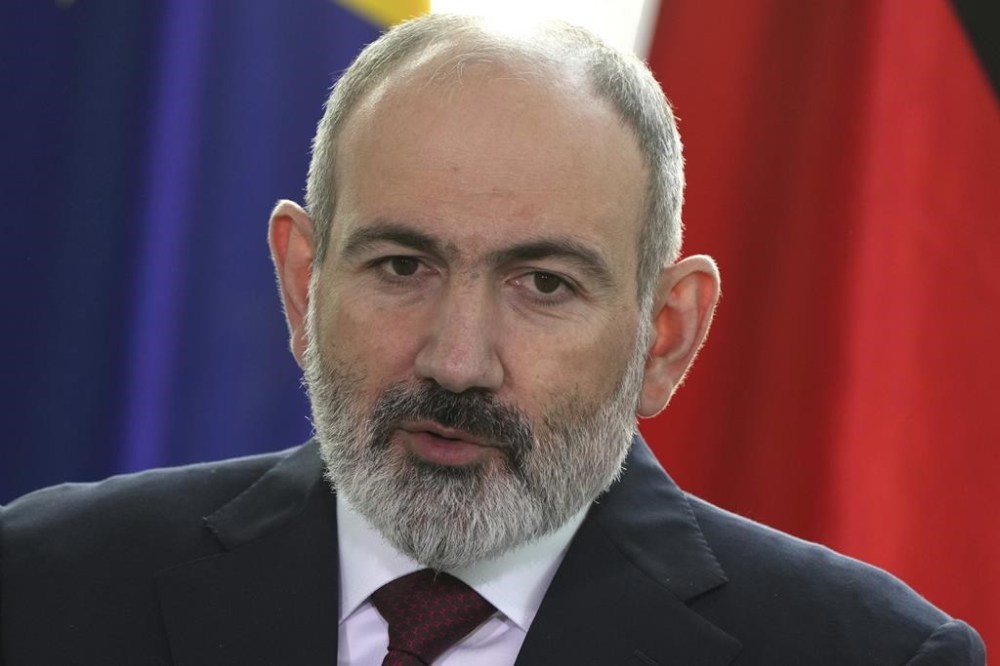Armenian PM critical of Moscow-dominated security pact
Advertisement
Read this article for free:
or
Already have an account? Log in here »
To continue reading, please subscribe:
Monthly Digital Subscription
$0 for the first 4 weeks*
- Enjoy unlimited reading on winnipegfreepress.com
- Read the E-Edition, our digital replica newspaper
- Access News Break, our award-winning app
- Play interactive puzzles
*No charge for 4 weeks then price increases to the regular rate of $19.00 plus GST every four weeks. Offer available to new and qualified returning subscribers only. Cancel any time.
Monthly Digital Subscription
$4.75/week*
- Enjoy unlimited reading on winnipegfreepress.com
- Read the E-Edition, our digital replica newspaper
- Access News Break, our award-winning app
- Play interactive puzzles
*Billed as $19 plus GST every four weeks. Cancel any time.
To continue reading, please subscribe:
Add Free Press access to your Brandon Sun subscription for only an additional
$1 for the first 4 weeks*
*Your next subscription payment will increase by $1.00 and you will be charged $16.99 plus GST for four weeks. After four weeks, your payment will increase to $23.99 plus GST every four weeks.
Read unlimited articles for free today:
or
Already have an account? Log in here »
Hey there, time traveller!
This article was published 14/03/2023 (968 days ago), so information in it may no longer be current.
YEREVAN, Armenia (AP) — Armenia’s prime minister on Tuesday accused a Moscow-dominated security alliance of leaving his country in the cold in the face of a threat of renewed hostilities with neighboring Azerbaijan.
Prime Minister Nikol Pashinyan has been repeatedly critical of what he described as the failure of the Collective Security Treaty Organization, or CSTO, to protect member Armenia amid a standoff with Azerbaijan over Nagorno-Karabakh.
Russia, which has sought to preserve strong ties with its ally Armenia while also maintaining friendly relations with energy-rich Azerbaijan, has engaged in a delicate diplomatic balancing act, avoiding any forceful action. The Kremlin’s clout in the region has become more limited as Russia has focused its resources on the war in Ukraine.

Pashinyan said at a news conference that it wasn’t Armenia that is pulling out of the CSTO, but, on the contrary, “the CSTO is pulling out of Armenia, whether it wishes so or not.”
“We are concerned about that,” Pashinyan said.
He emphasized that “the threat of escalation along Armenia’s border and in Nagorno-Karabakh is very high now,” noting “increasingly aggressive rhetoric from Azerbaijan.”
Tensions between Armenia and Azerbaijan soared in December when Azerbaijani protesters claiming to be environmental activists blocked the so-called Lachin corridor, the main road between Armenia and Nagorno-Karabakh, leaving its 120,000 residents short of food and other basic supplies. Last month, the United Nations’ highest court ordered Azerbaijan to allow the resumption of free movement along the road, but the situation has remained tense.
Nagorno-Karabakh lies within Azerbaijan but has been under the control of ethnic Armenian forces backed by Armenia since a separatist war there ended in 1994. In 2020, Azerbaijani troops routed Armenian forces in six weeks of fighting that ended with a Russia-brokered peace deal allowing Azerbaijan to take a significant part of Nagorno-Karabakh and reclaim nearby areas which had been in Armenian hands for nearly two decades.
During the latest standoff, Pashinyan and other Armenian officials strongly criticized Russia and the Moscow-dominated CSTO for the failure to ensure a free transit via the Lachin corridor.
Reflecting its irritation with Moscow, Armenia has canceled a planned military exercise by CSTO members set for this year and refrained from naming its representative to the bloc’s leadership.
Pashinyan said that he raised Armenian concerns about the situation during a call on Monday with Russian President Vladimir Putin and mentioned a recent protest staged by Nagorno-Karabakh residents in front of Russian peacekeepers’ headquarters.

Amid the tensions between Moscow and Yerevan, Armenian authorities denied entry to Margarita Simonyan, the head of Russian state-funded RT television, media manager Aram Gabrelyanov and Russian lower house member Konstantin Zatulin, who have been critical of Pashinyan’s leadership. Asked about the move, Pashinyan said they have shown disrespect to Armenia, which is entitled to use the tools it sees fit to “prevent actions against its interests.”
The Armenian leader noted “objective problems” in relations with the Kremlin, but said that he doesn’t think that they have grown into a crisis.
In another sign of his irritation with Moscow, Pashinyan said that Armenia would welcome other countries, such as the United States and Germany, to help broker peace talks with Azerbaijan.
He also noted that “the existing security architecture didn’t work,” adding that Yerevan was taking efforts to “establish military-technical cooperation with many other countries.”

